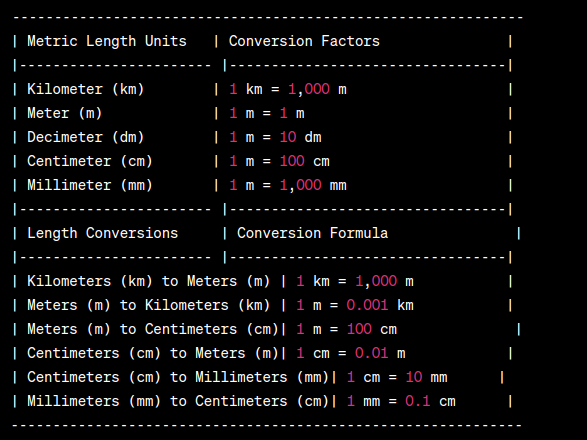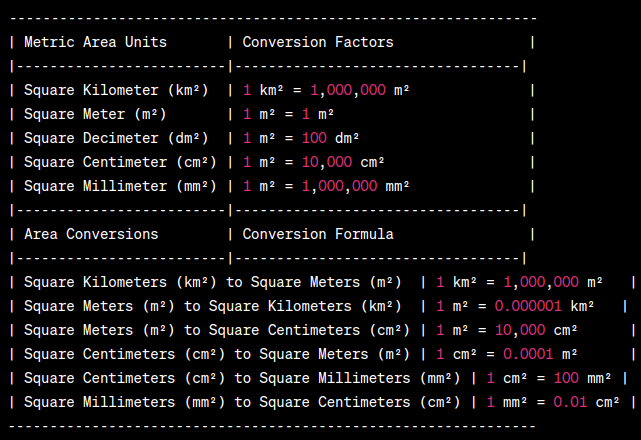A Metric Conversion Chart is a handy reference tool that assists in converting between different units within the metric system. It is particularly useful for simplifying calculations involving length, mass, volume, temperature, and more. Below is a comprehensive Metric Conversion Chart with explanations for each category.
Table of Contents
Metric Conversion Chart for Length
Metric Length Units:
- Kilometer (km): A kilometer is equal to 1,000 meters.
- Meter (m): A meter is the base unit of length in the metric system.
- Decimeter (dm): 1 meter is equal to 10 decimeters.
- Centimeter (cm): 1 meter is equal to 100 centimeters.
- Millimeter (mm): 1 meter is equal to 1,000 millimeters.
Length Conversions:
- Kilometers (km) to Meters (m): 1 km = 1,000 m. To convert from kilometers to meters, multiply the value by 1,000.
- Meters (m) to Kilometers (km): 1 m = 0.001 km. To convert from meters to kilometers, divide the value by 1,000.
- Meters (m) to Centimeters (cm): 1 m = 100 cm. To convert from meters to centimeters, multiply the value by 100.
- Centimeters (cm) to Meters (m): 1 cm = 0.01 m. To convert from centimeters to meters, divide the value by 100.
- Centimeters (cm) to Millimeters (mm): 1 cm = 10 mm. To convert from centimeters to millimeters, multiply the value by 10.
- Millimeters (mm) to Centimeters (cm): 1 mm = 0.1 cm. To convert from millimeters to centimeters, divide the value by 10.

Metric Conversion Chart for Area
Metric Area Units and Conversion Factors:
- Square Kilometer (km²):
- 1 square kilometer (km²) is equal to 1,000,000 square meters (m²).
- Square Meter (m²):
- 1 square meter (m²) is equal to 1 square meter (m²). (This is the base unit.)
- Square Decimeter (dm²):
- 1 square meter (m²) is equal to 100 square decimeters (dm²).
- Square Centimeter (cm²):
- 1 square meter (m²) is equal to 10,000 square centimeters (cm²).
- Square Millimeter (mm²):
- 1 square meter (m²) is equal to 1,000,000 square millimeters (mm²).
Area Conversions:
- Square Kilometers (km²) to Square Meters (m²): To convert square kilometers to square meters, multiply the value in square kilometers by 1,000,000.
- Square Meters (m²) to Square Kilometers (km²): To convert square meters to square kilometers, divide the value in square meters by 1,000,000.
- Square Meters (m²) to Square Centimeters (cm²): To convert square meters to square centimeters, multiply the value in square meters by 10,000.
- Square Centimeters (cm²) to Square Meters (m²): To convert square centimeters to square meters, divide the value in square centimeters by 10,000.
- Square Centimeters (cm²) to Square Millimeters (mm²): To convert square centimeters to square millimeters, multiply the value in square centimeters by 100.
- Square Millimeters (mm²) to Square Centimeters (cm²): To convert square millimeters to square centimeters, divide the value in square millimeters by 100.

Metric Conversion Chart for Volume
Metric Volume Units and Conversion Factors:
- Liter (L):
- 1 liter (L) is equal to 1,000 milliliters (mL).
- Cubic Meter (m³):
- 1 cubic meter (m³) is equal to 1,000 liters (L).
- Cubic Centimeter (cm³):
- 1 cubic centimeter (cm³) is equal to 1 milliliter (mL). These two are equivalent measures.
Volume Conversions:
- Liters (L) to Milliliters (mL): To convert liters to milliliters, multiply the value in liters by 1,000.
- Milliliters (mL) to Liters (L): To convert milliliters to liters, divide the value in milliliters by 1,000.
- Cubic Meters (m³) to Liters (L): To convert cubic meters to liters, multiply the value in cubic meters by 1,000.
- Liters (L) to Cubic Meters (m³): To convert liters to cubic meters, divide the value in liters by 1,000.
- Cubic Meters (m³) to Cubic Centimeters (cm³): To convert cubic meters to cubic centimeters, multiply the value in cubic meters by 1,000,000.
- Cubic Centimeters (cm³) to Cubic Meters (m³): To convert cubic centimeters to cubic meters, divide the value in cubic centimeters by 1,000,000.
Volume in Liquid Conversion Chart
Metric Liquid Volume Units and Conversion Factors:
- Milliliter (mL):
- 1 milliliter (mL) is equal to 1 milliliter (mL). (This is the base unit for liquid volume in the metric system.)
- Centiliter (cL):
- 1 centiliter (cL) is equal to 10 milliliters (mL).
- Deciliter (dL):
- 1 deciliter (dL) is equal to 100 milliliters (mL).
- Liter (L):
- 1 liter (L) is equal to 1,000 milliliters (mL).
- Hectoliter (hL):
- 1 hectoliter (hL) is equal to 100 liters (L).
Liquid Volume Conversions:
- Milliliters (mL) to Centiliters (cL): To convert milliliters to centiliters, divide the value in milliliters by 10.
- Centiliters (cL) to Milliliters (mL): To convert centiliters to milliliters, multiply the value in centiliters by 10.
- Milliliters (mL) to Deciliters (dL): To convert milliliters to deciliters, divide the value in milliliters by 100.
- Deciliters (dL) to Milliliters (mL): To convert deciliters to milliliters, multiply the value in deciliters by 100.
- Milliliters (mL) to Liters (L): To convert milliliters to liters, divide the value in milliliters by 1,000.
- Liters (L) to Milliliters (mL): To convert liters to milliliters, multiply the value in liters by 1,000.
- Liters (L) to Hectoliters (hL): To convert liters to hectoliters, divide the value in liters by 100.
- Hectoliters (hL) to Liters (L): To convert hectoliters to liters, multiply the value in hectoliters by 100.
Metric Conversion Chart for Weight
Metric Weight Units and Conversion Factors:
- Gram (g):
- 1 gram (g) is equal to 1 gram (g). (This is the base unit for weight in the metric system.)
- Decigram (dg):
- 1 decigram (dg) is equal to 10 grams (g).
- Centigram (cg):
- 1 centigram (cg) is equal to 100 grams (g).
- Kilogram (kg):
- 1 kilogram (kg) is equal to 1,000 grams (g).
- Metric Ton (t):
- 1 metric ton (t) is equal to 1,000 kilograms (kg) or 1,000,000 grams (g).
Weight Conversions:
- Grams (g) to Decigrams (dg): To convert grams to decigrams, multiply the value in grams by 10.
- Decigrams (dg) to Grams (g): To convert decigrams to grams, divide the value in decigrams by 10.
- Grams (g) to Centigrams (cg): To convert grams to centigrams, multiply the value in grams by 100.
- Centigrams (cg) to Grams (g): To convert centigrams to grams, divide the value in centigrams by 100.
- Grams (g) to Kilograms (kg): To convert grams to kilograms, divide the value in grams by 1,000.
- Kilograms (kg) to Grams (g): To convert kilograms to grams, multiply the value in kilograms by 1,000.
- Kilograms (kg) to Metric Tons (t): To convert kilograms to metric tons, divide the value in kilograms by 1,000.
- Metric Tons (t) to Kilograms (kg): To convert metric tons to kilograms, multiply the value in metric tons by 1,000.
Metric Conversion Chart for Temperature
Temperature Units and Conversion Formulas:
- Celsius (°C):
- Celsius is a metric temperature unit based on the freezing and boiling points of water at 0°C and 100°C, respectively.
- Fahrenheit (°F):
- To convert from Celsius to Fahrenheit: °F = (°C × 9/5) + 32
- To convert from Fahrenheit to Celsius: °C = (°F – 32) × 5/9
Temperature Conversions:
- Celsius (°C) to Fahrenheit (°F): To convert temperatures from Celsius to Fahrenheit, use the formula °F = (°C × 9/5) + 32.
- Fahrenheit (°F) to Celsius (°C): To convert temperatures from Fahrenheit to Celsius, use the formula °C = (°F – 32) × 5/9.
Metric Conversion Chart for Time
Time Units and Conversion Factors:
- Second (s):
- 1 second (s) is equal to 1 second (s). (This is the base unit for time in the metric system.)
- Millisecond (ms):
- 1 millisecond (ms) is equal to 1,000 seconds (s).
- Microsecond (µs):
- 1 microsecond (µs) is equal to 1,000,000 seconds (s).
- Nanosecond (ns):
- 1 nanosecond (ns) is equal to 1,000,000,000 seconds (s).
Time Conversions:
- Seconds (s) to Milliseconds (ms): To convert seconds to milliseconds, multiply the value in seconds by 1,000.
- Milliseconds (ms) to Seconds (s): To convert milliseconds to seconds, divide the value in milliseconds by 1,000.
- Seconds (s) to Microseconds (µs): To convert seconds to microseconds, multiply the value in seconds by 1,000,000.
- Microseconds (µs) to Seconds (s): To convert microseconds to seconds, divide the value in microseconds by 1,000,000.
- Seconds (s) to Nanoseconds (ns): To convert seconds to nanoseconds, multiply the value in seconds by 1,000,000,000.
- Nanoseconds (ns) to Seconds (s): To convert nanoseconds to seconds, divide the value in nanoseconds by 1,000,000,000.
Solved Examples on Metric Conversion
Example 1: Convert 4.5 meters to centimeters.
Solution: To convert from meters to centimeters, we know that 1 meter is equal to 100 centimeters. So, we can use this conversion factor:
4.5 meters × 100 centimeters/meter = 450 centimeters
Answer: 4.5 meters is equal to 450 centimeters.
Example 2: Convert 3.2 kilograms to grams.
Solution: To convert from kilograms to grams, we know that 1 kilogram is equal to 1,000 grams. So, we can use this conversion factor:
3.2 kilograms × 1,000 grams/kilogram = 3,200 grams
Answer: 3.2 kilograms is equal to 3,200 grams.
Example 3: Convert 750 milliliters to liters.
Solution: To convert from milliliters to liters, we know that 1 liter is equal to 1,000 milliliters. So, we can use this conversion factor:
750 milliliters ÷ 1,000 milliliters/liter = 0.75 liters
Answer: 750 milliliters is equal to 0.75 liters.
Example 4: Convert 30 degrees Celsius to Fahrenheit.
Solution: To convert from Celsius to Fahrenheit, we use the formula: °F = (°C × 9/5) + 32.
°F = (30 × 9/5) + 32 = 86 + 32 = 118
Answer: 30 degrees Celsius is equal to 118 degrees Fahrenheit.
Example 5: Convert 2.5 seconds to milliseconds.
Solution: To convert from seconds to milliseconds, we know that 1 second is equal to 1,000 milliseconds. So, we can use this conversion factor:
2.5 seconds × 1,000 milliseconds/second = 2,500 milliseconds
Answer: 2.5 seconds is equal to 2,500 milliseconds.